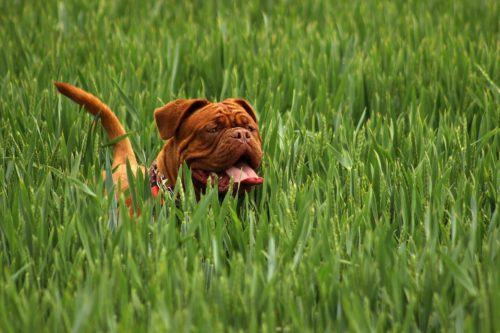The liver is one of the most important organs of a dog’s body. It has multiple functions including detoxifying the blood, metabolizing energy sources, and aiding in blood clotting and digestion. Liver disease can easily interrupt these functions and lead to other health issues for your pet. This article will look at the causes, signs, symptoms, and prevention methods of liver disease in dogs. It’ll help you understand more clearly, as a pet owner, what kind of symptoms to look out for in your dog and when it’s best to get a veterinarian involved.
It’s never fun to think about your dog facing serious illness, but being informed about signs and symptoms to look out for can be a benefit to you pet if he faces a serious health condition in the future.
Causes of Liver Disease in Dogs
Liver disease in dogs can be caused by a variety of things. This range of conditions includes pancreas issues, diabetes, long-term use of painkillers, fatty foods, and/or untreated heartworms. Certain mushrooms, algae, or molds can also be an instigating factor that causes liver trouble.

How exactly does liver disease occur? Dogs are surrounded by toxins everyday that can damage the liver and cause problems down the road. These toxins can stem from environmental bacteria, lawn chemicals, neurotoxins found in heartworm medication, aflatoxin, which is found in many pet foods, pollution, and even EMFs from cell phones and other electronic mobile devices. There are toxins that may not be immediately apparent in our everyday lives. Your dog’s liver may become weakened over time, if he has an increased exposure to toxins without relief.
If your dog suffers from liver disease, it’s important for your veterinarian to immediately know about his condition and specific symptoms he’s experiencing. He or she may have to alter your pet’s diet or medications as to not interfere with the current diagnosis. Depending on how severe the symptoms are, you veterinarian may choose to take a blood sample or biopsy to further evaluate the situation and provide a more accurate diagnosis and prognosis.
Furthermore, liver disease in dogs may be the result of aging, but in some cases, it’s genetic. Trauma or infection can also affect a dog’s liver, too. The bottom line is: there’s no singular thing that causes liver disease in all dogs. Each case is different and must be treated as such.
Signs of Liver Disease in Dogs
Once your dog becomes acclimated to your home, you’ll know his routine and behavior patterns. Anything out of the ordinary most likely will cause you to pay closer attention than usual. When your dog is experiencing pain or discomfort, it’s likely you’ll be able to tell based off certain symptoms he’s experiencing.
The earlier you are able to detect signs of liver disease, the better the chance of treatment will help with the medical condition. In addition to your regularly scheduled veterinary checkups, keep an eye out for any changes – big or small – in your pet’s appearance and behavior. Specific signs of liver disease in dogs may include:
- Constipation
- Diarrhea
- Dry, brittle, or infected nails
- Eye discharge or perceived pinkeye
- Sinus problems
- Dark urine
- Poor appetite
- Fatigue
- Increased irritability or aggression
Signs such as dark urine or constipation could be attributed to other non-related problems, but can still be indicators that your dog’s liver isn’t functioning as it should. Since the liver is meant to help with detoxification, it can be hard for it to keep up with the various toxins found in your dog’s food, living space, and general environment.
If your pet is showing signs listed above consistently, a visit to the veterinarian can confirm if liver disease is the culprit. From there, you and your dog’s doctor can come up with a treatment plan that will help keep your pet remain as healthy and comfortable as possible.
Symptoms of Liver Disease in Dogs
Other symptoms you may notice in your pet may be the result of the signs of liver disease. For example, if your pet is suffering from diarrhea or fatigue, he may have a lack of appetite which is contributing to those reactions. Loss of appetite can lead to weight loss, which can also lead to increased weakness. Other symptoms of liver disease include: bloody stools or urine, jaundice, or seizures in dogs.
These symptoms are scary for pets and their owners, so it’s important to be aware of any changes in your pet’s behavior and consult with a veterinarian right away if you have concerns. Whether the change is due to a temporary environmental factor or is the start of something more serious, it’s best to have your dog checked out sooner rather than later to eliminate need for concern.
Symptoms also typically occur in groups because they happen concurrently or build off one another, which can make your dog extremely ill. Knowing what signs and symptoms to look out for is one of the best ways to help you be proactive about your dog’s health.
Keys to Liver Disease Prevention

The best way to help your dog with liver disease is to prevent it from happening in the first place. Yearly exams and scheduled vaccinations are important to your pet’s health. It’s also important that your veterinarian is aware of all medications and supplements your dog is receiving. The mix of certain medications can cause harm to the liver. Also, certain vaccinations may not be completely necessary for your breed or age of dog.
While it’s impossible to remove all toxins from your dog’s environment, there are plenty of proactive ways you can help your dog avoid liver disease. Speak with your veterinarian about steps you can take to preserve your dog’s health as much as possible. One area you can get started is with your dog’s diet.
Eliminate Toxins Through Diet and Other Environmental Factors
You may not be able to eliminate all toxins, but you can remove many. This starts with reassessing your pet’s current diet. What kinds of foods are you relying on most for nutrition? Rather than rely on processed foods, reach for whole foods or foods made without added preservatives or non-organic ingredients, as much as possible. All-natural, nutritional foods and snack options can provide a healthy alternative for your dog without interfering with the rest of his diet or any medication plan.
Additionally, you can incorporate liver-healthy foods that helps the organ do its job of breaking down toxins. Discuss any diet changes with your dog’s veterinarian first and track your pet’s response to the changes. But for starters, adding more fresh fruits and vegetables can help your dog’s liver. A change in diet can be positive for your dog’s overall health, in addition to being focused on cleansing the liver itself. It’s good to do so at least twice a year. It helps support the organ’s functions and reduces symptoms like fatigue, allergies, arthritis, autoimmune disease, and more.
Cleansing your dog’s liver starts with reducing the number of processed or toxins in your pet’s food and providing your dog with filtered water. Clean your home without the use of toxic chemicals. And reduce the number of unnecessary vaccines or medications. Detoxifying your home is not only good for your dog, but good for you as well. Try to use organic products as much as possible. If you’re interested in what how else you start to remove the number of toxins affecting your dog, speak with a veterinary specialist to get a full assessment on what would work best for your pet.
Diagnosis and Treatment
Treatment for liver disease in dogs is dependent on providing aid for symptoms of liver disease rather than curing the disease itself. Treatment could include administering intravenous fluids to help with dehydration and provide necessary nutrition for your pet.
Medication may also be a suggested treatment based on the extent of liver damage your dog is suffering from. Since one of the organ’s functions is to metabolize medication, most likely your pet will receive a smaller dose since it will take longer to pass through the body.
For liver disease such as chronic hepatitis, corticosteroids for dogs may be prescribed to decrease inflammation and help stimulate the appetite. However, too many corticosteroids in the body can cause liver disease. This makes it extra essential to follow the prescribed medication and dosages as provided by your veterinarian. In most cases, medications are administered to help with the symptoms that cause pain as a result of liver disease. They may also help to prevent ulcers that could develop in the stomach or small intestine.

Additionally, it will be important to provide your pet proper nutrition and be mindful of the caloric intake and types of foods your pet is eating. In some cases, dogs with liver disease may lose their appetite and refuse to eat. If your dog is not maintaining his normal eating habits, he may need to undergo veterinary supervision to ensure he’s getting enough of the right nutrition.
However, if you are able to regulate your dog’s condition at home, your veterinarian can recommend a proper mix of vitamins and supplements to help prevent deficiencies. In this stage of care, it’s best to be as proactive as possible. While you may not have a cure for liver disease, instilling a regimen of improved diet and medication will help your dog live more comfortably for a longer period of time.
It’s when your dog’s liver disease transitions to liver failure that can cause additional, unexpected symptoms, side effects, and problems with your pet’s health. The sooner you can get a proper diagnosis and plan for treatment, the better it likely will be all around.
Frequently Asked Questions about Liver Disease in Dogs
Can my dog’s symptoms be indicative of something else besides liver disease?
Of course. While your dog may be showcasing symptoms commonly associated with liver disease, you won’t know for sure until your veterinarian does a complete checkup. When it comes to your dog’s health, it’s better to get a true veterinary assessment rather than try to guess what your dog is suffering from.
Is there a cure for liver disease in dogs?
There’s not a cure but there is treatment available to help limit or eliminate the symptoms of liver disease. This can help prolong your dog’s life span and introduce a more comfortable quality of life for your pet.
Is it true my dog can get liver disease from drinking bad water?
Two of the many causes of liver disease are mold or algae. Either can be found on stagnant or contaminated water sources. Make sure your dog always has fresh water in his bowl.
Are certain breeds predisposed to liver disease?
Dog breeds like Dobermans, Cocker Spaniels, Yorkshire Terriers, and Rottweilers have a predisposition to liver problems. It doesn’t necessarily mean a dog of this breed will suffer from liver disease. It means that it’s important to take extra precautions in terms of health care for your pup.
A Change in Lifestyle
Much like humans, as dogs age, the way they are able to avoid serious illness or eat whatever they want diminishes. You must be prepared to change the way you provide care for your pet and teach others who watch after him to do the same. If your dog requires a stricter diet or specific medication, it must be communicated to anyone who cares for your dog. This includes everyone from the doggy daycare he spends his days at to the neighbor who may occasionally walk or sit for your dog.
It’s not enough to implement healthier habits for the short-term. A liver disease diagnosis means an immediate need for change toward a healthier lifestyle. Continue to schedule regular appointments with your veterinarian. Follow the treatment plan as prescribed and note any disruptions that may occur between visits to the veterinary clinic. A dog’s health can be unpredictable, so the more you can regulate what affects him in his daily life, the more it will help down the road. Here’s to healthy, happy dogs!




